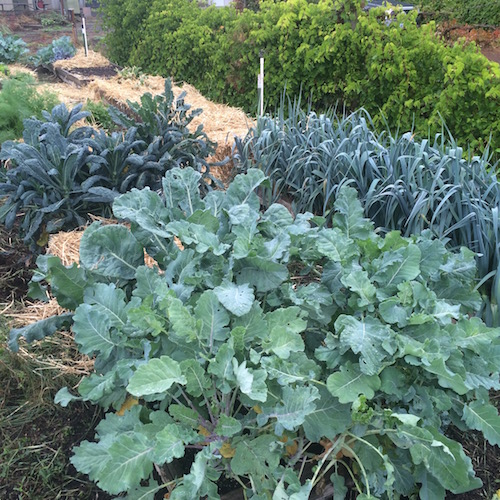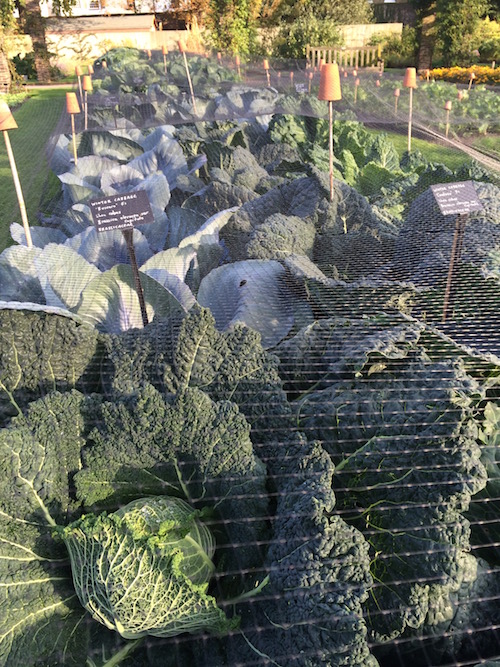While you watch your first tomatoes ripen on the vine, and seek out summer swimming holes, the thought of roasted winter roots, or a January kale salad are probably the last things on your mind. But if you want to be feasting from your garden in the dreary dark days of Winter, the time to think about what to plant is now!
The Importance of Timing
Every Fall I get calls from clients telling me how excited they are to plant a Winter garden this year. And I have to spoil the party and tell them they are about two months too late!!
Though it may be counter-intuitive, most of the Winter vegetables that can be harvested from October-March are planted in a narrow and important window from late July to Mid-August. Vegetables planted earlier than this window will become over mature and be finished before Winter temperatures set in. Most vegetables planted later than the middle of August will not have enough time when days are longer and temperatures are warmer to grow to maturity.
But Why Should I Grow a Winter Veggie Garden?
The Willamette Valley has an amazing climate for growing vegetables over the Winter. Many people think that growing a Winter veggie garden requires special equipment or expert knowledge, but it's not true!! There is an incredible diversity of things that will grow in your garden, outside, without any special protection. All of the vegetables listed here will also tolerate sub-freezing temperatures without complaint!
The other great thing about growing Winter vegetables is that they are a lot less work than Summer veggies! Because of the colder/shorter days of Fall, if you keep your garden weeded in the late summer, the weeds won't have a chance to rebound. And you can forget about watering as well because winter precipitation offers more than enough.
Growing your own Winter vegetables doesn't require cold frames, greenhouses, or special equipment. All you have to do is plant the right Winter hardy veggies at the right time!
Top Ten Vegetables for your Winter Garden
Beets: These beloved roots can grow nearly year round, but are actually sweetest when grown in colder Winter temperatures. Because they are root vegetables, they should always be grown from seeds. Beet greens are delicious as well and can be used like chard.
Seeding Date: 7/15
Cabbage: Another vegetable that has much better flavor when grown in Winter than when grown in warm Summer temperatures. When planted in early-mid August (from transplants), cabbage, depending on the variety, will reach full maturity between December and February. One of my favorite varieties for a Winter harvest is called "January King."
Planting Date: 8/15
Winter cabbage grows larger and ripens sweeter than summer grown cabbage.
Cauliflower: Late Winter cauliflower is an incredible treat. These wondrous vegetables grow very large in Winter. You only get one head of cauliflower per plant, but it all feels like it's worth it in the end. Cauliflower is great in a curried soup or roasted in the oven with most things on this list.
Planting Date: 8/15
Carrots: Carrots are one of the most important vegetables in my garden. They are an incredibly efficient use of space, versatile in the kitchen, can be harvested 10 months out of the year, and have incredible tolerance for cold temperatures! So why wouldn't you grow them in your winter vegetable garden?
Seeding Date: 8/1
Carrots are a necessity in my Winter garden. I sow them from seeds planted directly into the garden around August 1st.
Collard Greens: Most people associate collards with the summer flavors of southern cuisine, but Collards are actually very well suited for Winter growing in our climate. A single plant will produce many many leaves over the Fall and Winter. In the Spring, when your Collards finish their life and begin to "bolt" you can harvest the flower buds before they bloom and have delicious sweet collard "raab" or "rapini"! My favorite variety for Winter planting is "Champion," true to its name.
Planting Date: 8/15
Kale: In the same family as collard greens, kale is grown in much the same way. Kale has a much bigger following among foodies than collards, but both are indispensible in my winter garden. I usually grow several varieties of kale for Winter. 'Lacinato' or 'Dino' kale has superior flavor in my opinion, but is less productive and a little less hardy than some of the Russian types like 'Red Russian' and 'Siberian.' And you can never have too much kale, so grow a few varieties!
Planting Date: 8/15
Kale is another great choice for Winter planting. It produces for many months and can tolerate sub-freezing temperatures without a problem!
Kohlrabi: This vegetable gets a lot of flack for its odd name, unconventional shape, and lack of familiarity for many people. But Winter kohlrabi offers a sweetness and succulent crispness that is unmatched. Winter Kohlrabi can also grow several times as large as kohlrabi grown in the Summer! My favorite way to use kohlrabi is to grate it and make a nice slaw with an Asian style dressing with rice vinegar, sesame oil, and garlic. Yum!
Planting Date: 8/15
Parsnips: You have to wait a long time for parsnips to mature, but when they do come, they offer a totally unique and wonderful flavor to your Winter kitchen. I like to roast them as "fries" with or without potatoes and season them with a little paprika, chili powder, and salt. They are also great roasted thoroughly and then blended into a soup with potatoes.
Seeding Date: 7/1-7/15
Rutabaga: Another underappreciated vegetable in my opinion. A relative of the turnip, rutabaga offers the sweetness of turnips and the starchiness of potatoes. Of all of the root vegetables, rutabagas are among the most cold tolerant, and can survive temperatures into the low teens! They also store extremely well. My favorite varieties for winter planting are 'Helenor' and 'American Purple Top'
Seeding Date: 8/1
Rutabaga, the underappreciated relative of the Turnip, is extremely cold hardy and very long storing.
Spinach: Spinach is one of the few more tender salad greens that can withstand the torments of Winter. It despises the heat of Summer, and so it is always a welcome sign of the changing seasons when I am finally eating spinach from my garden again. It is quick to grow and can be planted a little later than some other winter vegetables. My favorite varieties for Winter are 'Giant Winter' and 'Bloomsdale'.
Planting Date: 9/1
Sprouting Broccoli: Traditional broccoli doesn't do well in the Winter and is best grown in the Fall and Spring seasons. 'Sprouting Broccoli', however, is a lesser known relative of broccoli that is an exceptional addition to a Winter garden. The very best varieties produce small purple florets in late Winter. When they come on, they do so in abundance, and they are one of my very favorite Winter vegetables! They can be used just like regular broccoli, or broccolini, and they bring a sweetness and vibrance that is hard to come by in most gardens in February. Best varieties are 'Rudolph' and 'Purple Sprouting Broccoli'.
Planting Date: 8/15
Purple Sprouting Broccoli, a late Winter delight, is as delicious as it is beautiful!
Turnips: Turnips are a Winter standby. They are reliable, fairly easy to grow, frost tolerant, and delicious! There are many types of turnips so make sure to choose varieties that are noted for cold tolerance as not all turnips make the cut. Since they are root vegetables, they should always be grown from seed (like carrots, beets, and parsnips). The classic turnip for Winter production is 'Purple Top White Globe'.
Seeding Date: 8/15
August is right around the corner, so don't let your opportunity for a Winter garden pass you by. Mark your calendars and get some of these veggies planted ASAP!!!
Happy Growing,
Ian Wilson
Owner, Portland Edible Gardens








